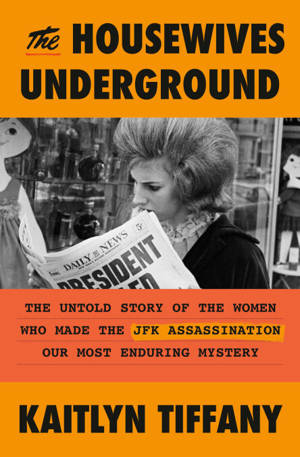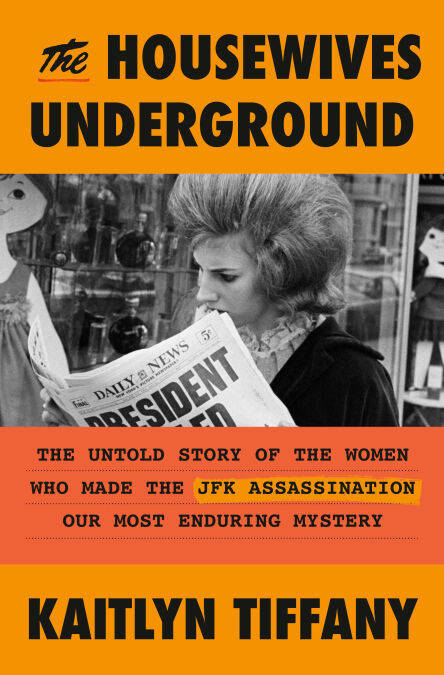
- Retrait gratuit dans votre magasin Club
- 7.000.000 titres dans notre catalogue
- Payer en toute sécurité
- Toujours un magasin près de chez vous
- Retrait gratuit dans votre magasin Club
- 7.000.0000 titres dans notre catalogue
- Payer en toute sécurité
- Toujours un magasin près de chez vous
The Housewives Underground EBOOK
The Untold Story of the Women Who Made the JFK Assassination Our Most Enduring Mystery
Kaitlyn Tiffany
Ebook | Anglais
16,76 €
+ 16 points
Description
The remarkable untold story of a network of amateur researchers who debunked the Warren Report, raising questions about JFK's assassination that remain unanswered to this day—a riveting history of obsession, heartbreak, and the myth of the great American century from an Atlantic staff writer
In the winter of 1967, the official story of the Kennedy assassination was under threat. A scattered group of Americans had pointed to major problems with the report prepared by President Johnson’s hand-picked Warren Commission. Most surprising to some, “the typical ‘sleuth’ was more the concerned housewife than the big city hustler.” The women questioning the report, as one journalist observed, outnumbered the men two-to-one. Politicians and reporters alike referred to these women as “scavengers” and bored “housewives.” They suggested they were eccentric, delusional people with murder-mystery fixations or crushes on the deceased President Kennedy. Actually, they were the most important among the early self-described “students” or “critics” of the Warren Report.
In The Housewives Underground, Kaitlyn Tiffany resurrects the story of Maggie Field, Shirley Martin, and Sylvia Meagher after decades of dismissal. Shirley Martin traveled frequently to Dallas, enlisted her children to help interview key witnesses, and irritated J. Edgar Hoover with her "antagonistic" attitude toward the FBI. Maggie Field hosted a screening of a bootleg copy of the Zapruder film and fundraised for a new investigation. And at the center of the story is Sylvia Meagher—a born-and-raised New Yorker who lived in the Village and worked at the United Nations, was devoted to the ballet and the Mets, cultivated fierce friendships and firm grudges, and dedicated twenty-five years to her conviction that the whole truth of JFK’s assassination had not been told. Among her many contributions, Sylvia produced a comprehensive index for the Warren Report’s thousands of pages of supporting evidence. Together they raised justifiable doubts about the report’s conclusions, which no subsequent government account has been able to fully dispel.
Meticulously researched and engrossing, The Housewives Underground takes readers through the turbulent 1960s and 1970s—a time when more Americans began questioning what the government was telling them—revealing the incredible lives of Sylvia and her fellow so-called “Housewives” and bringing to light the crucial, overlooked role they played in asking the first, hardest questions about one of the most shocking events in American history.
In the winter of 1967, the official story of the Kennedy assassination was under threat. A scattered group of Americans had pointed to major problems with the report prepared by President Johnson’s hand-picked Warren Commission. Most surprising to some, “the typical ‘sleuth’ was more the concerned housewife than the big city hustler.” The women questioning the report, as one journalist observed, outnumbered the men two-to-one. Politicians and reporters alike referred to these women as “scavengers” and bored “housewives.” They suggested they were eccentric, delusional people with murder-mystery fixations or crushes on the deceased President Kennedy. Actually, they were the most important among the early self-described “students” or “critics” of the Warren Report.
In The Housewives Underground, Kaitlyn Tiffany resurrects the story of Maggie Field, Shirley Martin, and Sylvia Meagher after decades of dismissal. Shirley Martin traveled frequently to Dallas, enlisted her children to help interview key witnesses, and irritated J. Edgar Hoover with her "antagonistic" attitude toward the FBI. Maggie Field hosted a screening of a bootleg copy of the Zapruder film and fundraised for a new investigation. And at the center of the story is Sylvia Meagher—a born-and-raised New Yorker who lived in the Village and worked at the United Nations, was devoted to the ballet and the Mets, cultivated fierce friendships and firm grudges, and dedicated twenty-five years to her conviction that the whole truth of JFK’s assassination had not been told. Among her many contributions, Sylvia produced a comprehensive index for the Warren Report’s thousands of pages of supporting evidence. Together they raised justifiable doubts about the report’s conclusions, which no subsequent government account has been able to fully dispel.
Meticulously researched and engrossing, The Housewives Underground takes readers through the turbulent 1960s and 1970s—a time when more Americans began questioning what the government was telling them—revealing the incredible lives of Sylvia and her fellow so-called “Housewives” and bringing to light the crucial, overlooked role they played in asking the first, hardest questions about one of the most shocking events in American history.
Spécifications
Parties prenantes
- Auteur(s) :
- Editeur:
Contenu
- Nombre de pages :
- 320
- Langue:
- Anglais
Caractéristiques
- EAN:
- 9780593728611
- Date de parution :
- 22-06-26
- Format:
- Ebook
- Protection digitale:
- Adobe DRM
- Format numérique:
- ePub

Les avis
Nous publions uniquement les avis qui respectent les conditions requises. Consultez nos conditions pour les avis.






